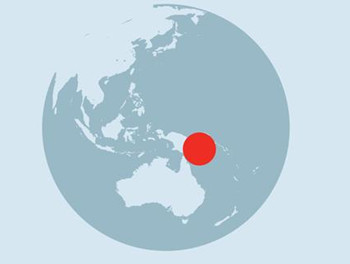'I just thought it was beautiful to look at and had a well-honed, worn look, and a patina that made me feel that it was used - and used again and again. It is a fundamental act both of cooking and of living, and living with a family and passing on, at least in India.
“我只覺得它看起來很美麗,打磨精致,有點磨損,古色古香,讓我覺得這是一把曾經被反復使用過的舂杵。至少在印度,使用它,會是一種烹飪與生活中最基本的行為,一種代代相代的家庭生活。”
'When I left India, which was a long long time ago, my mother gave me certain utensils to take with me, and they were all heavy, I remember that. There was a wok, a grinding stone, and a huge mortar and pestle, so those are what I left with, and I have all of them, and I use my mortar and pestle to this day.'
“很多很多年前,當我離開印度時,我母親送給我一些廚具帶在身上,我記得它們可真是沉甸甸的呵。有個鍋、研磨石,還有研缽跟舂杵。這些就是我離開家時的所有,現在我還保留著,這研缽跟舂杵還在天天使用。”
Other stone pestles and mortars have also been found in New Guinea, and what they show is that there were farmers growing crops in the tropical forests and grasslands here in ancient times, around ten thousand years ago.
其他石杵與研缽也在新幾內亞出土,它們顯示了一萬年前左右,在這些熱帶森森與草原上,已經出現在人類從事農業勞作、養育莊稼的身影
This relatively recent discovery has upset the conventional view that farming began in the Middle East, in what's called the Fertile Crescent, and from there spread across the world.
相當近期的考古發現挑戰了傳統觀點,認為農業起源于中東一帶所謂“新月沃土”的地區,隨后向世界各地蔓延。
We now know that in fact this particular bit of the history of humanity happened simultaneously in many different places.
我們現在知道,其實在這段人類歷史上的特定時期,這種變化在全球范圍內是同步產生的。
Clearly a lot of us became farmers at the same time, and wherever people were farming, they began to concentrate on a small number of plants, selectively harvesting these from the wild, planting and tending them.
顯然我們當中相當多的人開始在這時期轉換成農民的角色,而且不管人類在何地耕作,他們總是開始把注意力集中到若干類的植物種類上,有選擇性地從野外采集回來,種植起來,用心照料。
In the Middle East, they chose particular grasses - early forms of wheat; in China, wild dry rice; in Africa, sorghum - a grain that looks a bit like grass; and in Papua New Guinea, the starchy tuber, taro.
在中東,人類選擇了一種特殊的草本植物,以最早期的小麥,在中國的是野生旱稻,在非洲是一種看上去有點像野草的高梁,在巴布亞新幾內亞, 是芋頭這種淀粉塊莖。
For me, the most surprising thing about these new plants is that in their natural state you very often can't eat them at all, or at least they taste pretty filthy if you do. Why would you choose to grow food that you can eat only once it's been soaked or boiled or ground to make it edible at all?
對我而言,最值得驚嘆的莫過于,這些新植物在自然狀態下其實是不可食用的,至少很難下咽。為何人類會選擇種植這種得經過像浸泡、煮沸或研磨后才可以食用的食物呢?
Martin Jones, Professor of Archaeological Science at Cambridge University, sees this alchemy of food as an essential part of human evolution:
劍橋大學考古學教授馬丁·瓊斯把加工提煉食物看成是人類進化過程中的重要組成部分:
'As the human species expanded across the globe, we had to have a competitive edge over other animals going for the easy food.
“隨著人類在全球范圍內擴張,我們避免不了在那此唾手可得的食物方面與其他動物進行激烈競爭。












